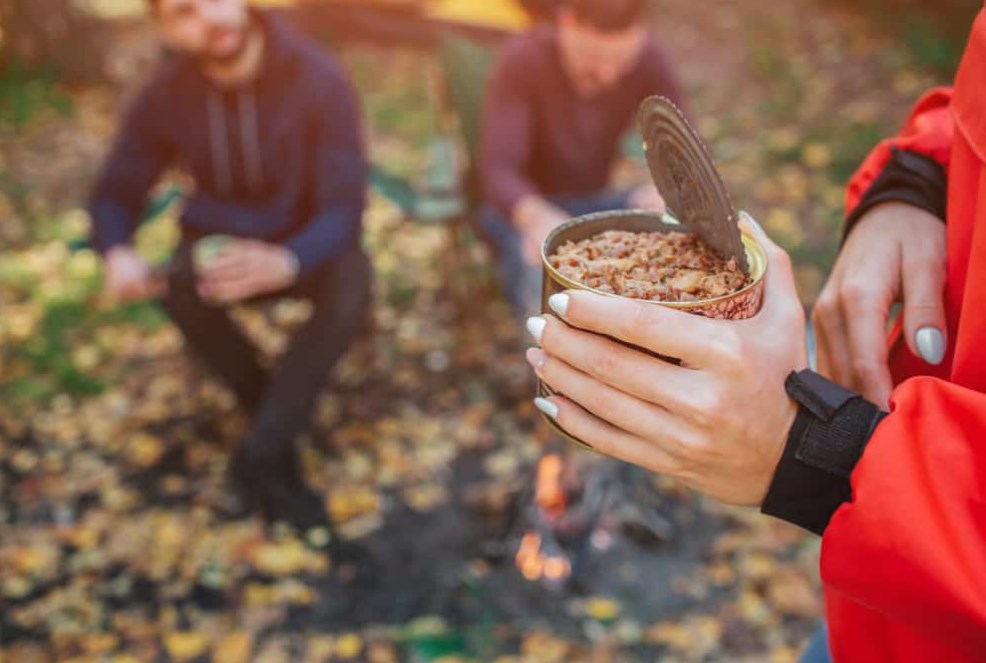Canned food is perfect for camping for various reasons, all of which you are going to find in this article, along with some other useful tips for an easy meal outdoors.
Pros and cons of canned food
Camping trips are much more fun if you arrange them carefully. Surely, camping meals are one of the most important things for a lovely family outing in nature, especially when fresh food is not an option.
In this article, we describe the best-canned foods for camping. Also, we try to understand whether the easiest camping meal can be healthy too.
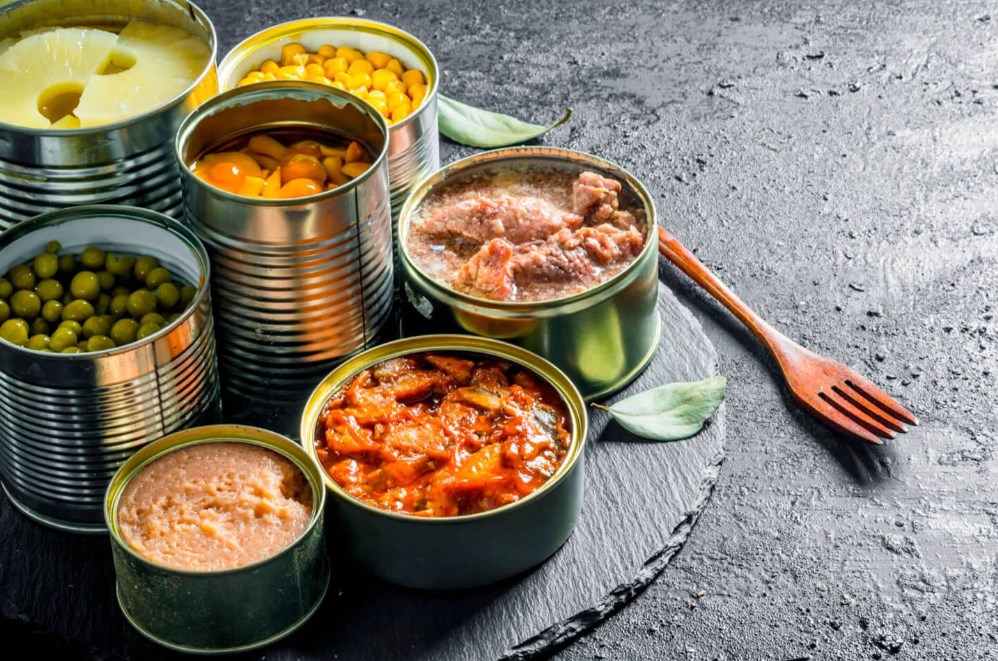
What is canned food?
Canning is a way of processing food to extend its shelf life. Some procedures may vary depending on the food, but it goes through three major steps:
- Processing: The first major set of steps contains washing, peeling, cutting, chopping, pitting, or cooking before canning. Once the food is ready, it is time to fill the cans with either water or juice and special seasoning.
- Sealing: The next step is to put food into airtight cans and seal the lid.
- Heating: The final step is quickly heating canned food to a precise temperature for a specified amount of time to kill harmful bacteria and prevent spoilage.
Advantages of canned foods
- You get the best flavor and high nutritional value – canning preserves a lot of nutrients. The quality and quantity of minerals, fat-soluble vitamins, proteins, fats, and carbohydrates remain almost unchanged. Some water-soluble vitamins such as vitamins C and B experience transformation due to high heat involvement in canned foods.
- You can incorporate more vegetables and fruit into the diet: you don’t throw them due to spoilage, you can afford to buy more for the same price, and they are easier to cook.
- You may increase fiber intake – canning helps make fiber in certain vegetables more useful to the human body, and studies have even linked increased intake to significant weight loss.
- Cans are lightweight, durable, and easy to carry and dispose of.
Disadvantages of canned foods
- High salt content. Though some canned products are available in low-salt and salt-free alternatives, still most of them contain big amounts of salt. Excessive salt consumption increases the risk of some health problems, for example, high blood pressure.
- May contain added sugar. Many varieties of fruits come packed in syrup, so always read the label and choose low-sugar options.
- May contain preservatives.
- May cause botulism. Foodborne botulism results from contaminated foods in which Clostridium botulinum spores germinated and produced botulism toxin. Avoid cans with dents, bulges, cracks, or leaks, and you will be just fine.
Best canned foods for camping meals
When it comes to tent camping, food is not the easiest thing to organize.
Keeping fresh fruit, vegetables and other food refrigerated is not an option, and taking a cooler is just another weight on your back.
That is why canned food is a great choice for camping, but there is still one problem – it can be difficult to decide what kind of food to bring with you.
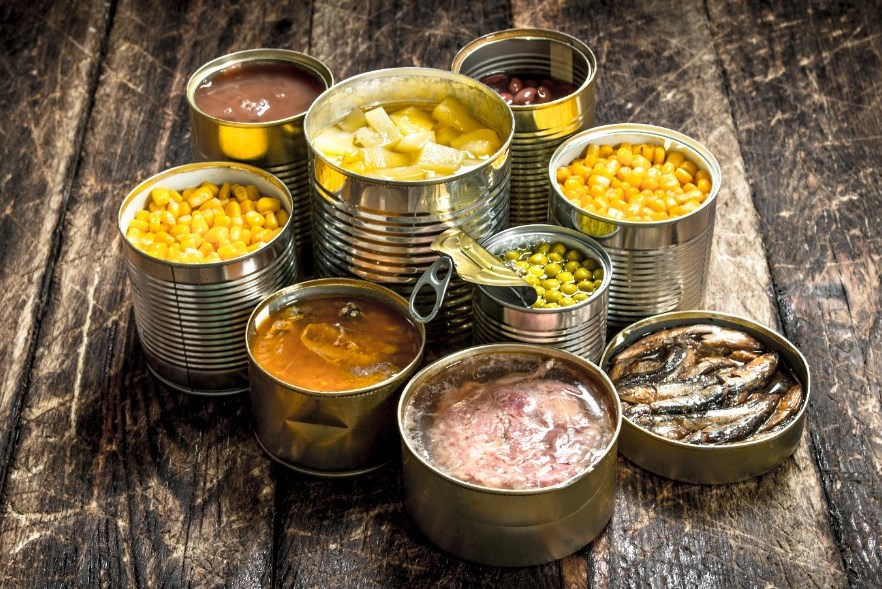
Canned meat
Canned meats are perfect for quick and easy wraps and sandwiches. They also go great in soups, salads, and stews.
Canned meat may not be as delicious as the one you make in your kitchen, but it is 100% more convenient and just as tasty if you are using the right recipes.
- Canned chicken
- Canned beef
- Canned pork
- Canned ham
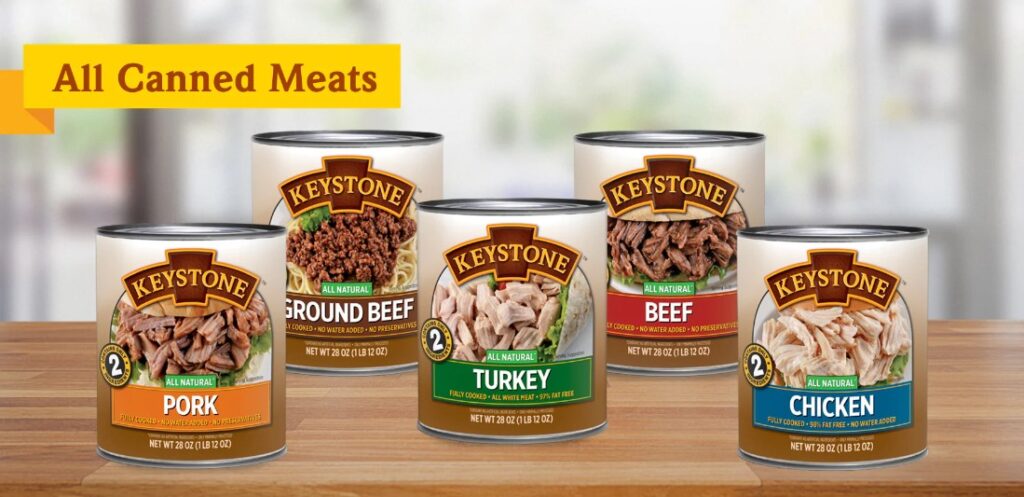
Canned fish
There is a big variety of canned fish that has a long shelf life and, like the meat above, makes the process of cooking extremely easy.
Canned fish is affordable, convenient, and nutritious. Sometimes you don’t even have to cook – just eat canned fish straight out of the can on crackers with some lemon juice, salt, and pepper.
- Canned tuna
- Canned salmon
- Canned sardines
- Canned anchovies
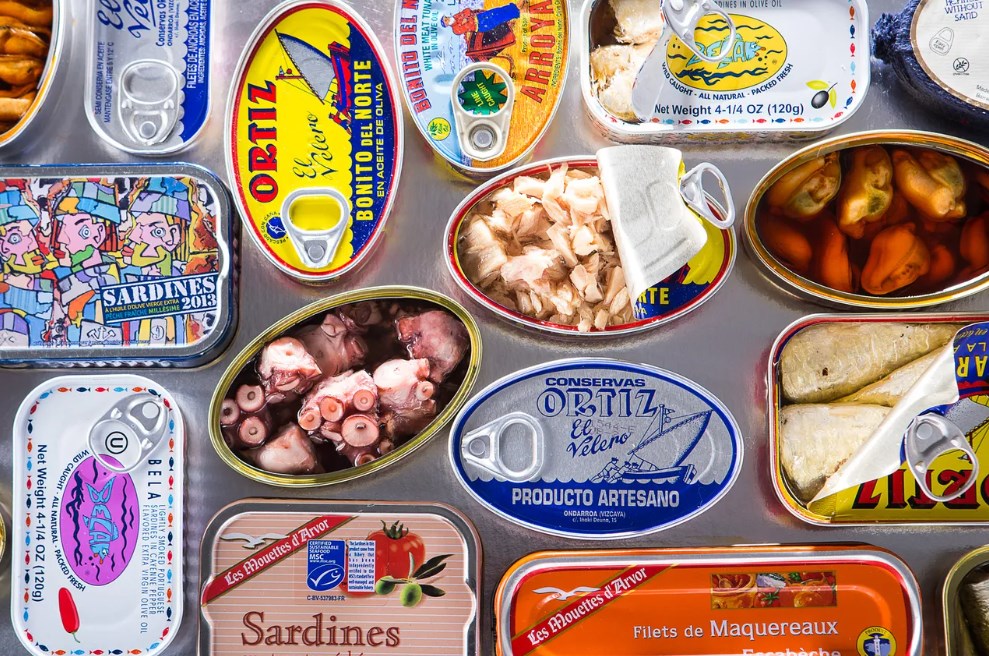
Canned stew
This is a great meal (especially stewed steak) and some even consider it a delicacy. It is far more substantial than soup and doesn’t taste as if it came out of a can at all.
- Canned beef stew
- Canned vegetable stew
- Canned oyster stew
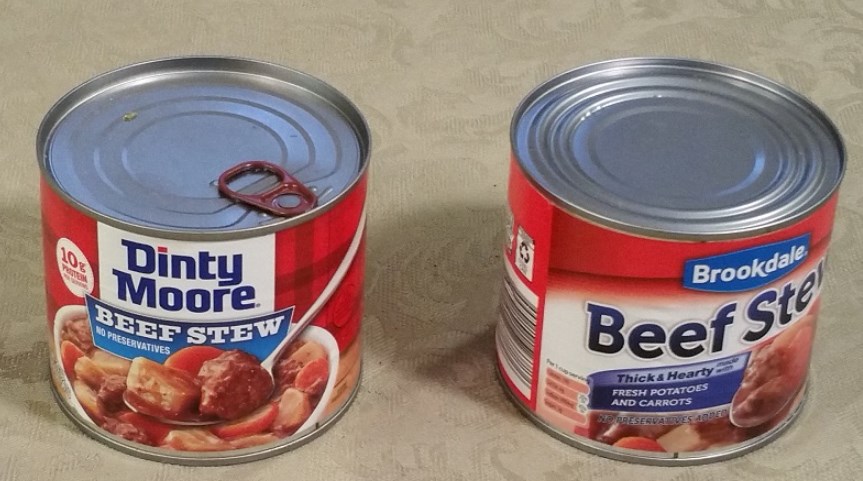
Canned fruit
Canned fruits are healthy (watch out for the syrup), and great camping food. You can eat them for breakfast, as a snack at any time, or as a tasty dessert.
- Canned peaches
- Canned mandarin oranges
- Canned pineapple
- Canned pears
- Canned fruit salad
- Canned fruit cocktail
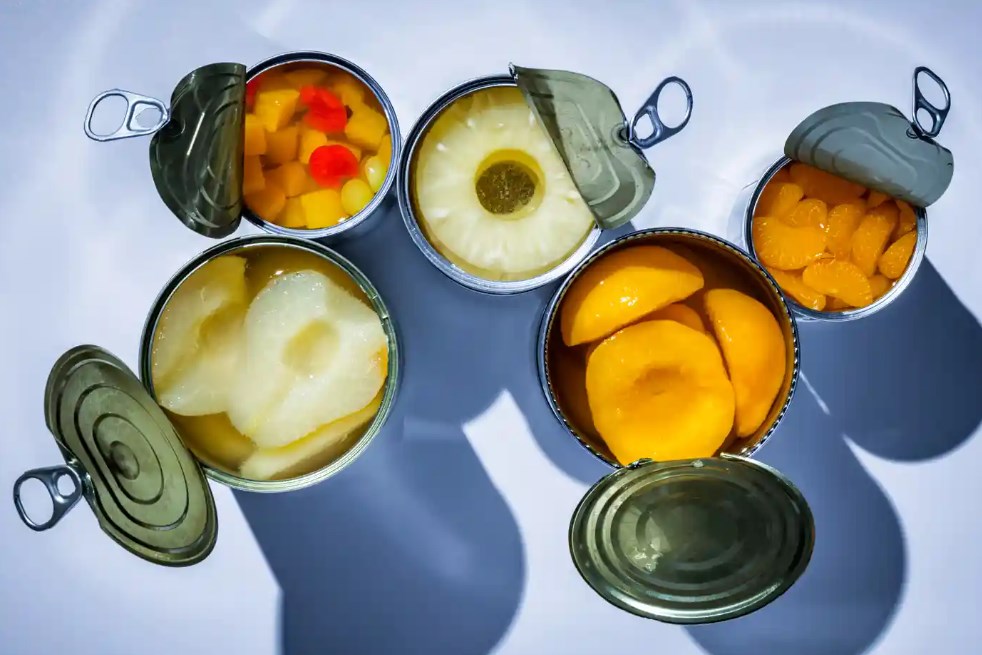
Canned vegetables
Canned vegetables make a delicious meal when paired up with rice or potatoes, and they make a good snack to enjoy throughout the day.
- Canned beans
- Canned green beans
- Canned corn
- Canned peas
- Canned carrots
- Canned tomato sauce
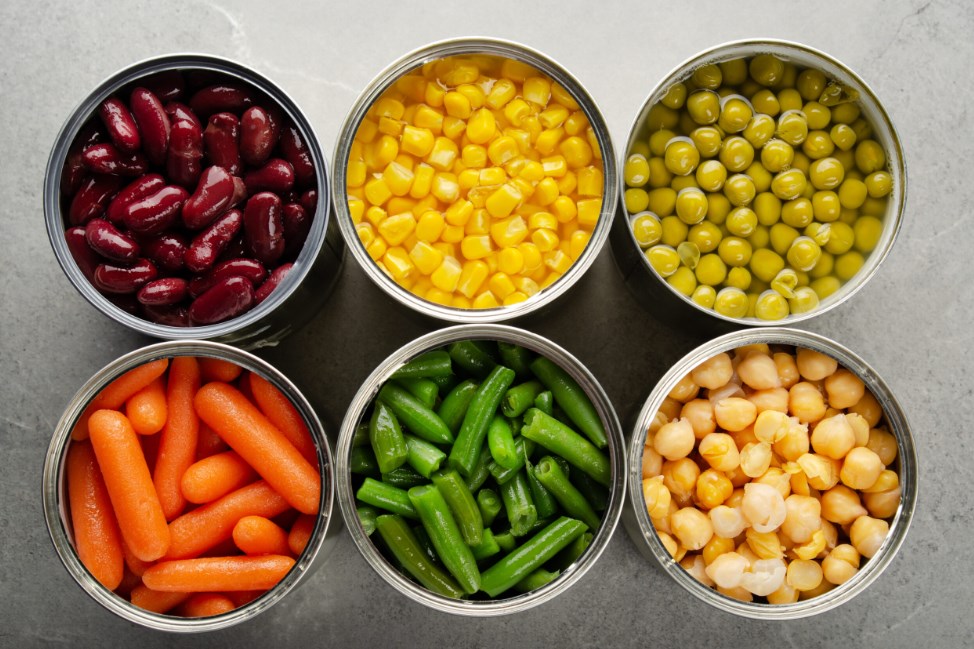
Canned soup
Canned soups are ready in minutes, they come in all kinds of flavors, and they are good for lunches and as a main meal.
Soup can also be very helpful when you need to keep your body warm and hydrated.

Canned chili
Canned green diced chiles are a must when it comes to camping meals. They can be used in many dishes such as tacos, quesadillas, and burritos. It is a good camping tradition that will spice up your outdoor meals.
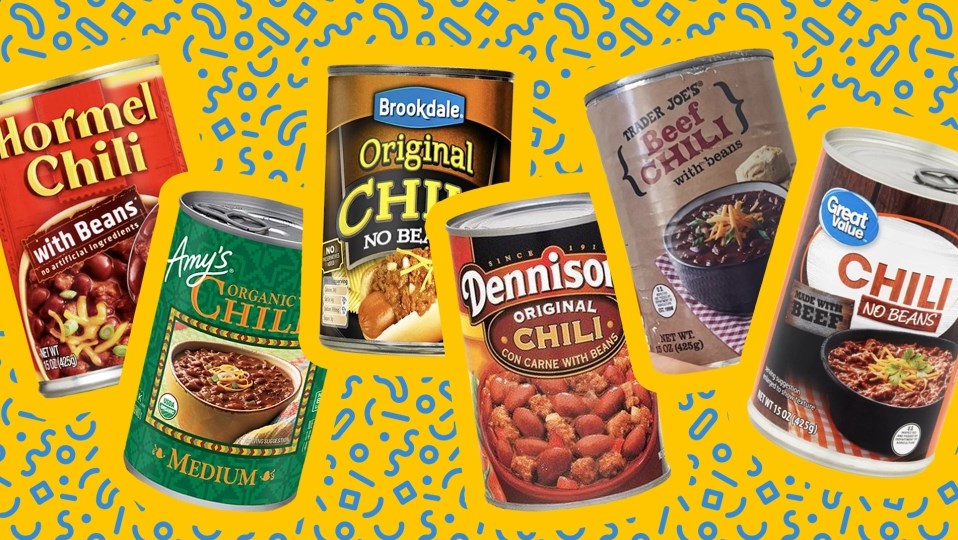
Canned Macaroni and cheese
All times comfort food and a recognizable taste. A simple, yummy addition to other canned meats or vegetables.
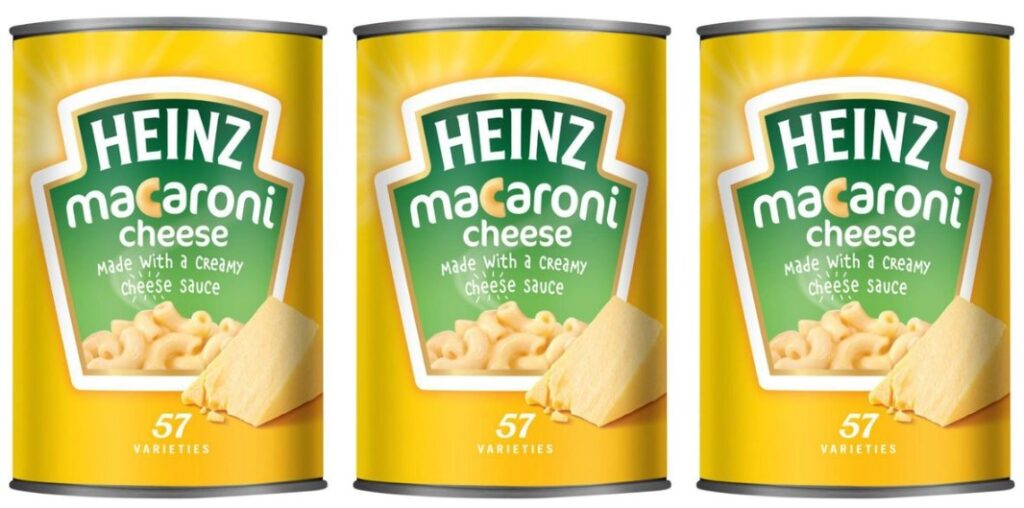
Canned pasta
If you need to quickly refuel your energy, then pasta is your best option.
Some campers like to pack dry pasta that they can cook over the fire, while others prefer eating canned pasta like spaghetti in tomato sauce cold.

Canned ravioli
Canned ravioli is a quick and easy meal to prepare, and you can even eat it cold or heat it with a camp stove or with just boiling water. It’s also inexpensive, so it won’t break your budget for the trip.

Camping foods you do not need to refrigerate
There are a lot of other food options that you can benefit from when taking camping with you.
A big variety of snacks, delicious breakfast foods, and even desserts that you don’t need to put in the freezer or even cook. Here are some of our favorite options.
- Crackers
- Cookies
- Dried fruit
- Granola bars
- Instant oatmeal packets
- Peanut butter and jelly sandwiches and toasts
- Jerky
- Rice dishes
- Cake
- Pudding
- S’mores
Choose the healthiest and simply best-canned foods for camping
- Choose lower sugar and lower sodium versions. You’re looking for foods with no added sugar or salt, but canned foods can have a little of each and still be healthy.
- Avoid BPA canned linings. Though cans are made with steel, their linings are often made with a substance that contains BPA (Bisphenol-A), an industrial chemical.
- Do not select canned foods with artificial preservatives and ingredients.
- When selecting canned fish like tuna, opt for the “canned in water” label.
- Canned pumpkins, beans, coconut milk, canned fish, black olives, and canned vegetables are the best options for a healthy diet out of a can.
FAQ
Is canned food good for camping?
Canned foods are a perfect way to make camping trips enjoyable and easy to pack. Canned foods are rich in nutrients and fiber, lightweight, take just a few minutes to cook, or can be eaten cold, and they are also very tasty.
Look through the possible variants, choose the best-canned food there is, explore various meal ideas, and have an unforgettable trip.
What food should I bring for 3 days camping?
For a 3-day camping trip, you should bring food items that are suitable for campfire meals, on-the-go meals, and snacks.
Most people who go camping will want a good carb-heavy breakfast, a portable lunch, and a nice warm dinner. Porridge, sandwiches, and a one-pot stew are good simple choices for a 3-day camping trip.
Campfire Meals: These are your most important meals, where you get the majority of your calories.
You can cook almost anything on a campfire or a stove, but it’s best to plan out 5-7 ingredient dinners. Usually meat or fish as the main course, vegetables, and high-calorie side dish.
On-The-Go Meals: In order not to waste a lot of time on cooking, lunch could be a light and simple meal that you make in 5 minutes or less. It is usually some kind of sandwich or wrap that you can throw together fast.
Calorie-Dense Trail Snacks: Grab high-calorie trail snacks to fill in the gaps during the day.
You cannot always stop for dinner when you’re hiking down the trail, so it is nice to have crackers, nuts, trail mix, protein, or granola bars in your pockets.
What food in cans lasts the longest?
According to the research performed by the Department of Nutrition, Dietetics, and Food Science at Brigham Young University, some canned foods can last a minimum of 2 years.
Those include corn meals, macaroni pasta, pinto beans, potato flakes, white rice, apple slices, wheat, and powdered milk.
Canned fruits will retain their flavor and nutritional value for up to 18 months. Canned vegetables may not maintain their texture or flavor for eight years, but they will still be safe to eat.
Sardines, tuna, and other types of canned fish are packed with healthy omega-3s, and you can eat them straight from the can.
This combination of nutrition and convenience makes them the perfect survival food. Many such products can last between three and six years, even some types of canned meat.
What is the best food to take camping?
The best food is the food you enjoy eating. There are plenty of variants from breakfast foods to desserts, from almost delicacy like canned salmon to energy bars.
You can take anything with you as long as you are prepared to carry it on your back and have enough room in your bag.
Ideally, your food should be lightweight, stay edible and tasty without a cooler nearby and give you enough energy for all outdoor activities.
Extend the shelf life of canned products
The most important factors to take into consideration are humidity, air, light, and temperature.
Low humidity extends the shelf life of canned food. If you can keep your cans at a humidity level of less than 15%, you can expect them to last much longer.
The Canned Food Alliance recommends storing your canned food at moderate temperatures of 75℉. This can increase the shelf life by up to 2 years, and its nutritional value can last well beyond that.
Don’t hesitate to discard damaged cans. If there are any cracks, dents, or leaks they can compromise the seal, allowing bacteria to enter. Bacteria may contaminate the contents and even cause botulism.
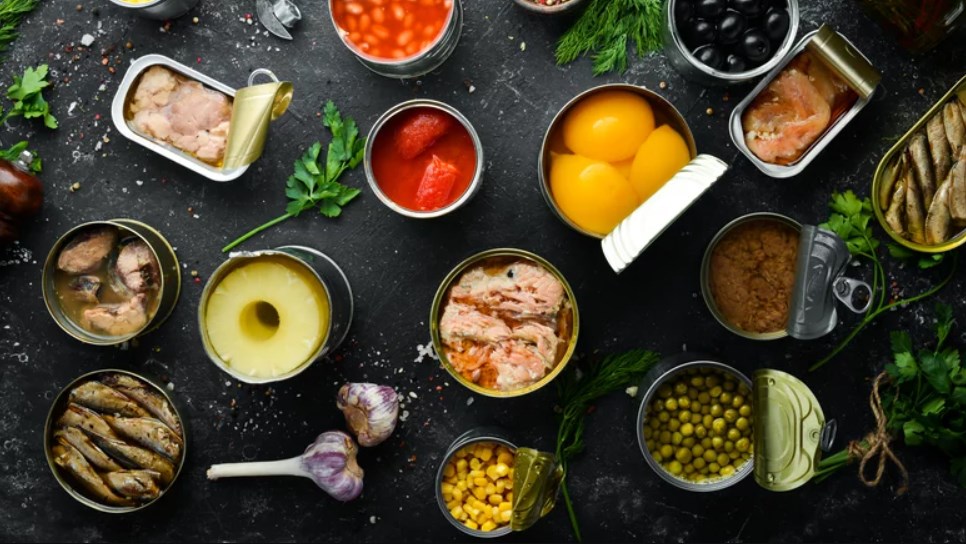
Best canned food brands
There are a lot of canned foods on the market, but only some brands meet all the healthy requirements.
Best canned vegetables
- Green Giant
- Del Monte
- Libby’s
- Farmer’s Market foods
Best canned fruit
- Dole
- Farmer’s market
- Del Monte
- Aroy-D
- 365
Best canned fish
- Cento
- Jose Gourmet
- Wild Planet
- Bela
- Ortiz
Best canned meat
- Survival fresh
- Wild planet
- Swanson
- Keystone
- Libby’s
Summing Up
Many beginners tend to over-pack food when camping. The best way to avoid this trap is to make a list of what you need for each meal.
For example, for a weekend trip, you require a meal for Friday night arrival, Saturday breakfast, lunch and dinner, and Sunday breakfast if you are leaving in the morning.
Be as specific as possible and get everyone in on the planning process.
There is a big choice of foods you can take for camping, and some of the best options are canned products and foods that do not require refrigeration.
But being a good camper is not solely about preparation for the trip. It also means being responsible and includes putting all trash away or burning it and making sure the campfire is put out.
Hopefully, this information will help you pack faster, lighter, and with fewer worries involved. Enjoy your camping and your camping meals!
Read also: How Long Does A 1lb Propane Tank Last – learn right now

My name is Olivia Kellison. I have been camping with friends and on my own for a long time. For me, camping is a great way to escape everyday life’s chaos. I started this blog because I have always had a passion for the great outdoors, and here I am gladly sharing what I know with other outdoor enthusiasts. It does not matter whether you are an experienced adventurer, or just planning your first trip, my blog will be of great help to you.

